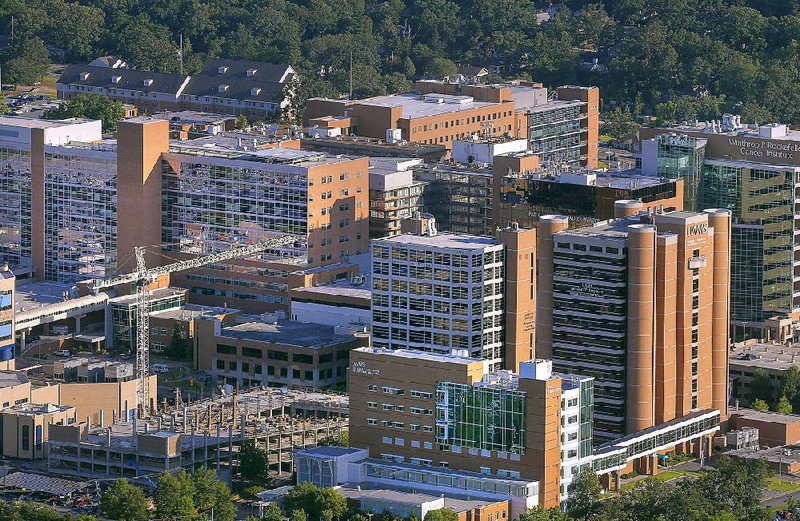MONTICELLO -- The University of Arkansas for Medical Sciences has made up its budget shortfall -- for now -- though it reported Wednesday its largest source of revenue was lower than expected.
UAMS cut about 725 positions, nearly a third of which were filled, earlier this year to address a budget crisis. Now, UAMS is $2.3 million ahead of budget -- a $39.8 million deficit approved by trustees last May -- because of an increase in "non-operating revenues," such as investment income, and a reduction in expenses, according to a presentation its officials made to trustees at a board meeting in Monticello on Wednesday.
"The biggest piece of that is our patient revenues," said Bill Bowes, UAMS' senior vice chancellor for finance and administration and chief financial officer. "They're trending down about 3 percent below budget, although we're up from the prior year about 3 percent."
Through February, patient-care revenue -- nearly 80 percent of its revenue -- has totaled about $702.4 million, about $16.7 million behind what had been budgeted, according to the presentation.
UAMS officials have been giving the UA board updates on their financial health since January, after announcing they were slashing 600 positions, 258 of which were filled at the time. The move was made to help curb an anticipated $72.3 million deficit, nearly twice the amount budgeted.
The anticipated deficit led to monitoring from UA System internal auditors, who are reviewing effects of UAMS' budget reductions and revenue enhancements.
The next month, the academic medical center informed the board it will eliminate 124 more jobs through attrition, suspend a $45 million maintenance plan and make other spending changes.
"We have cut an extreme amount of expense out of this budget in a very short period of time" said Stephanie Gardner, UAMS' interim chancellor.
UAMS' finances are not sustainable in the long term, she said.
Most of its funding comes from patient revenue, and UAMS leaders had budgeted for an increase of 5 percent in that area, Bowes said.
"I think we were aggressive" with the revenue expectations, said Amanda George, interim chief financial officer for the UAMS Medical Center. She added that most health care organizations do not see that type of growth.
About 6 percent of UAMS' budget comes from the state, and about 3 percent comes from tuition, Bowes has said. The remainder is made up of capital gifts, federal grants and contracts, among other things.
Its state appropriations peaked in fiscal 2014 at about $120 million, but that amount has dropped to about $107 million-$108 million annually over the past few years, Bowes has said. About $21.5 million of state appropriations are "pass-through or designated funds," leaving UAMS with $86 million.
On top of that, UAMS shells out a varying amount annually for a Medicaid match. In fiscal 2016, after the match, UAMS had a net state appropriation of about $8 million to operate its hospital, academic and research arms. The next fiscal year, UAMS' net state appropriation was $31 million.
Part of Wednesday's presentation included a comparison of state funding to other health-sciences universities.
Trustees spoke about the need for greater state funding to support UAMS, which has a three-pronged mission to educate health care professionals, provide patient-centered health care and advance research.
"The bottom line is, our institutions are not being funded similar to other states' similar institutions," said Dr. Stephen Broughton, a psychiatrist and UA board member.
Metro on 03/29/2018

